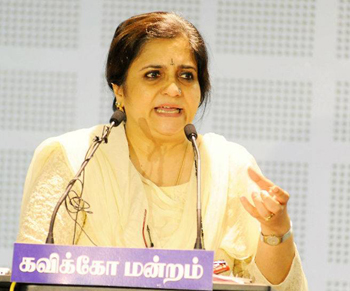New Delhi, Oct 21: Social activistTeesta Setalvad has moved theSupreme Court to intervene in the ongoing debate over nexus between candidates and religious leaders and sought a ban on the use of "Hindutva" interchangeably with Hinduism in elections.
 Setalvad along with retired professor and theatre activist Shamsul Islam and journalist Dilip C Mandal moved a joint intervention application before a 7-judge Constitution bench headed by Chief Justice T S Thakur requesting reconsideration of a December 1995 SC judgement that had ruled that `Hindutva' was a way of life and could not be equated with any religion.
Setalvad along with retired professor and theatre activist Shamsul Islam and journalist Dilip C Mandal moved a joint intervention application before a 7-judge Constitution bench headed by Chief Justice T S Thakur requesting reconsideration of a December 1995 SC judgement that had ruled that `Hindutva' was a way of life and could not be equated with any religion.
The current petition would affect BJP directly as the party has held up the SC ruling in support of its claim that it is not seeking votes on religious lines and is rather advocating a cultural identity and nationalism.
The court had ruled that the use of Hindutva during elections could not be held to be a corrupt practice to invite disqualification of a candidate: a determination which was celebrated by the BJP which swears by Hindutva, calling it a cultural concept derived from the civlisational ethos of the country . The pending petition related to disqualification of a candidate for using speeches of Bal Thackeray and Pramod Mahajan seeking votes in the name of Hindutva and Hindu Rashtra in the 1990 Maharashtra assembly elections. The HC had disqualified the candidate for falling foul of Section 123(3) of Representation of the People Act, which bans use of religion, caste, community and language as a tool to garner votes.
Disputing the SC's 1995 ruling that `Hindutva' is a way of life, the applicants requested the court to decide -"Whether a candidate who contests on the ticket of a political party which in its manifesto appeals to `Hindutva' as being the political agenda of the party , is not thereby guilty of corrupt practice within the meaning of Section 123 in as much as he has consented to and subscribed to the manifesto of that party?" Setalvad and her co-applicants said that the ruling "had the effect of encouraging political parties to use religious appeals for garnering votes under the colour of the proposition that Hindutva is not a religion but a way of life".
"This has had devastating consequences leading to demands of homogenisation and assimilation of minority communities and SCST in the `Hindutva' way of life.Hindutva has become a mark of nationalism and citizenship. Such an interpretation has curtailed the faith in secularism, which is a basic feature of the Constitution," the petition said.
Setalvad, a known opponent of RSS and BJP who has accused PM Narendra Modi of complicity in 2002 Gujarat riots, and two others severely criticised the NDA government's governance, alleging that since coming to power, it has made free thinkers and those upholding Constitutional values feel insecure and put "India at crossroads".
"For the past two years, articulation of a narrow, supremacist variety has engendered a deep feeling of insecurity for minorities, free thinkers, atheists and all those who uphold the Constitutional ideal of an India meant for all, irrespective of caste, creed, gender, politics or faith. The applicants, who are public intellectuals committed to peace, social harmony and social justice, seek to put certain key perspective before the Supreme Court," it said.
"India is at crossroads today , at the educational and cultural level, and in terms of interpretation of the law, too, narrow and supremacist interpretation of history , culture, social studies and the law threaten how the fundamentals of Indian nationhood are, in future conceived and built," the petition said.
"Tendencies to approach these rich and vast areas of the social sciences through narrow interpretations of `faith' and `mythology' threaten to stifle academic pursuit and scientific temper essential to a modern nation in the 21st century . Disturbing portents in Indian public life -seeking to justify customs and practices on the ground of their being from the `Shashtras' or `Sharia' -are equally worrisome and condemnable," it said.
They also requested the SC to decide two other important questions -"Whether subscribing to the manifesto of a political party which calls for formation of a `Hindutva State' is not deemed consent on the ground of religion of the candidate?" and "Whether an appeal by a candidate for a `Hindutva State' is not an appeal for a theocratic state and therefore, ultra vires the basic feature of the Constitution?"





Comments
Hindu religion name should be changed to sanathan dharm.
Arabs gave the name hindu.
Add new comment